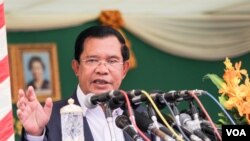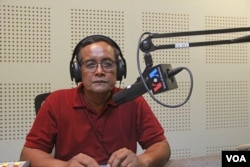Prime Minister Hun Sen on Wednesday publicly mocked the Paris Peace Agreement, the accords that ended Cambodia’s long-running civil war in 1991, saying the détente had “passed away.”
Speaking to garment workers during a rally in Phnom Penh on Wednesday, Hun Sen, a former Khmer Rouge commander who was a key signatory to the Paris agreement, said the agreement was no longer valid as several of the participants no longer existed due to the collapse of the Soviet Union and the incorporation of the Khmer Rouge into the Cambodian armed forces.
He added that moves to dissolve the opposition Cambodia National Rescue Party and hand out its seats to other minor political parties was in-line with the Paris accords, which specified that Cambodian democracy should promote pluralism.
“If one party is dissolved, there will be another five political parties that replace it, meaning that the number of political parties will rise from two parties to six parties in parliament,” he said.
Meas Ny, a political analyst, said the Paris accords still provided a roadmap for Cambodian political development.
“When we talk about democracy, it means that this society has freedom and justice for all the people who fulfill their duties as good citizens,” he said. “But the government sees something different in its citizens. They think that democracy must have a code of conduct, meaning it’s democracy caught in a net.
“So we saw already when citizens begin to fulfill their roles as responsible citizens, meaning they have problems and speak out to the government to get a response, the government thinks that is an attempt to start a revolution,” Meas Ny added.
“The leaders understand [democracy] a different way," he said. "The leaders think it’s democracy as long as it’s under their rule, while the people think what’s happening now is not democracy, it’s autocratic rule.”
Sebastian Strangio, author of “Hun Sen’s Cambodia”, said while the Paris accord was still legally valid, the promises upon which it was based had never been implemented.
“Indeed, the current crackdown appears to represent Prime Minister Hun Sen’s final repudiation of the agreement, which he and the CPP government have always seen as illegitimate. Like Cambodia’s (very fine) Constitution, the Paris Agreements are now largely a dead letter,” he wrote in an email.
Son Chhay, CNRP chief whip, could not be reached for comment, but Mu Sochua, CNRP vice president, was quoted in the Phnom Penh Post as saying that the ideals of Paris were not dead. Rather, the ruling party was violating the agreement’s terms and acting unconstitutionally.










